|
|
|
Sort Order |
|
|
|
Items / Page
|
|
|
|
|
|
|
| Srl | Item |
| 1 |
ID:
151774
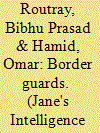

|
|
|
| 2 |
ID:
167800
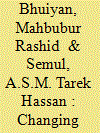

|
|
|
|
|
| Summary/Abstract |
The nature and means of conducting warfare have always been changing. Technology, political realities and ideologies continue to play crucial role in this transformation as witnessed in the two world wars, the Cold War, and in following decades. Non-state actors became more visible and important. Nowadays, many wars involve such actors against state parties, for example, the US global war on terror, Israel-Hezbollah War (2006) and the current war against the Islamic State (ISIL). The term hybrid war involves a combination of traditional and nonconventional means, has become a common subject of discussion. But hybrid war is nothing new and has been practiced since ancient times. Several countries have now resorted to hybrid war: one such country is Russia, who has been blamed by western countries in this regard, e.g., in Georgian War (2008), Crimea (2014), ongoing conflict in eastern and south Ukraine, disinformation campaign against the West and interference in their governance process. Russia similarly, blames them for its destabilization by increased military presence on its borders and inciting revolutions in neighbour countries. Meanwhile, countries are developing hybrid warfare capacities, including plans for deploying military robots. Non-state actors now also use hybrid means like the Hezbollah or ISIL and several ongoing wars are becoming growingly hybrid; besides, the clash of ideologies, i.e., religious radicalism vs. white supremacism can create conflicts, indicating future wars may be even more so. Yet, some old mechanisms and strategies are likely to remain relevant and useful in future wars as well, suggesting their true ever-evolving and hybrid character.
|
|
|
|
|
|
|
|
|
|
|
|
|
|
|
|
| 3 |
ID:
131367
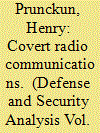

|
|
|
|
|
| Publication |
2014.
|
| Summary/Abstract |
Covert operations by underground groups, such as transnational terrorists, are not new and neither are the methods members of these groups use to communicate in their shadowy world. In this regard, one of the enduring myths is that the main means these covert operatives use to communicate within their cell structure are telephones and emails in their various manifestations. This article critically discusses the possible use of wireless transmissions by transnational terrorists as a reliable form of communications. To critically discuss this proposition, a force field analysis was used to assess the theory that radio is a viable option. Implications of this study's findings are considered in terms of the ramifications they have for defence and security policy.
|
|
|
|
|
|
|
|
|
|
|
|
|
|
|
|
| 4 |
ID:
137133
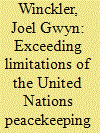

|
|
|
|
|
| Summary/Abstract |
United Nations peacekeeping is implemented by a complex bureaucratic organization, which itself can be a source of dysfunction and failure. This article empirically explores the strategies officials within the United Nations Mission in Liberia and the Department of Peacekeeping Operations apply in order to continue to do their job as effectively as possible despite the limitations of the UN peacekeeping bureaucracy. The findings demonstrate that internal acknowledgement and relevance of work are core strategic goals of UN officials. However, as the actual practices of achieving these objectives vary at different levels and locations of the UN peacekeeping bureaucracy, these strategies contribute to a significant diversity of local and decentralized decision-making frameworks rather than a rationalized effective bureaucracy.
|
|
|
|
|
|
|
|
|
|
|
|
|
|
|
|
| 5 |
ID:
174903
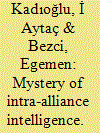

|
|
|
|
|
| Summary/Abstract |
Intra-alliance intelligence is utilised to collect, process and evaluate information about allies. This task played a critical role when the Southern Flank of NATO, Greece and Turkey caused a severe dispute in Cyprus which has been Europe’s longest remaining cold conflict. The Turkish Secret Service’s operations in Cyprus during its origins in the Cold War and the intra-alliance intelligence task have been largely overlooked in the existing literature. The article aims to close this gap through a threefold analysis: support for resistance, operational assistance, and capabilities and war preparedness. The investigation of Turkey’s covert operations in Cyprus between 1953 and 1970 reveals the route of intra-alliance espionage in the Cyprus conflict and helps understanding how states act covertly against their allies. The article uses archival documents in the UK and Turkey that provide extensive declassified secret documents to assess the covert action of Turkish intelligence in the Cyprus conflict.
|
|
|
|
|
|
|
|
|
|
|
|
|
|
|
|
| 6 |
ID:
190774
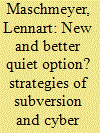

|
|
|
|
|
| Summary/Abstract |
Theorizing on cyber conflict has moved from warfare to conflict short of war, but strategic thought has not kept pace. This article argues cyber conflict is subversive, builds on intelligence scholarship to identify strategies of subversion, and examines their applicability in cyber conflict. It distinguishes three subversive strategies: manipulation, erosion and overthrow. The analysis shows cyber operations can only implement one of these strategies (erosion), indicating they offer less strategic value than traditional counterparts. Accordingly, although cyber operations offer superior scale, I argue their scope of influence is more limited. Finally, the article discusses strategic implications and identifies possible counterstrategies.
|
|
|
|
|
|
|
|
|
|
|
|
|
|
|
|
| 7 |
ID:
147473
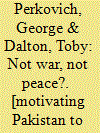

|
|
|
|
|
| Publication |
New Delhi, Oxford University Press, 2016.
|
| Description |
xii, 297p.hbk
|
| Standard Number |
9780199467495
|
|
|
|
|
|
|
|
|
|
|
|
Copies: C:1/I:0,R:0,Q:0
Circulation
| Accession# | Call# | Current Location | Status | Policy | Location |
| 058807 | 363.32/PER 058807 | Main | On Shelf | General | |
|
|
|
|
| 8 |
ID:
168202
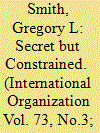

|
|
|
|
|
| Summary/Abstract |
Recent international relations scholarship has argued that political elites constrain the use of military force by democracies. Despite the persuasiveness of this research, scholars have largely ignored elite dynamics’ ability to constrain the initiation of covert operations. This omission is consequential because scholars of US foreign policy often assume that covert operations serve as a substitute for the overt use of force; secrecy allows leaders to limit information to congressional elites and thus weaken their oversight capabilities. Do elite political dynamics constrain presidents’ ability to act secretly or do they affect the overt use of force only? I argue that elite political constraints—particularly opposition from Congress—extend to the president's ability to initiate covert operations. By examining the trade-off between US military force and CIA-initiated covert operations during the Cold War, I find the likelihood that covert operations are initiated decreases significantly during periods of divided government and that there is no distinguishable trade-off between covert operations and overt military force. The results suggest that constraints on covert operations became more uniform across unified and divided government following congressional oversight reforms in 1975 that reduced the information asymmetry between the majority and minority party. These findings have important ramifications for the nascent literature on back-door bargaining and covert signalling. Because democratic leaders frequently face domestic political costs even when acting in secret, covert operations should allow leaders to credibly convey their resolve.
|
|
|
|
|
|
|
|
|
|
|
|
|
|
|
|
|
|
|
|
|